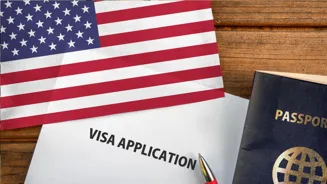What is the story about?
The White House’s Office of Information and Regulatory Affairs has approved a proposed rule that could change how H-1B visas are given to foreign workers
in specialty jobs, according to Bloomberg Law report. This step means the government may soon make the new rule public. The proposal is expected to revive a Trump administration plan that would give priority to H-1B applicants based on their salaries instead of the current random lottery system. However, the US Citizenship and Immigration Services (USCIS) has not yet shared official details about the rule.
Current H1-B System
Currently, the H-1B program allows 85,000 visas each year, mostly used by the technology sector. Under the present system, a random lottery decides which employers can apply for visas.
In 2021, the Department of Homeland Security (DHS) suggested a change, to rank applicants by wages in four categories, with higher-paying jobs getting preference.
During Donald Trump’s presidency, DHS tried to replace the lottery with a wage-based system as part of the “Buy American, Hire American” policy. The goal was to ensure that highly skilled foreign workers earning more money would get the visas first. However, critics said this change would sharply reduce the number of foreign workers hired, especially younger professionals and recent graduates.
The Biden administration withdrew the plan in 2021 after strong public opposition. Courts also blocked earlier efforts to limit the types of jobs eligible for the program and to raise minimum wage requirements.
What Will Change Under New H-1B Visa Regulation?
With this new approval, the government may once again attempt to reform the H-1B application process. Trump had often criticized the program, claiming it was misused to hire lower-paid foreign workers at the cost of American jobs, particularly in the tech industry. His administration introduced stricter rules to protect American wages and employment.
If the new wage-based system is implemented, higher-paid and more experienced workers would likely have a better chance of getting visas, while companies might change their hiring strategies to attract candidates who meet the new standards.





















